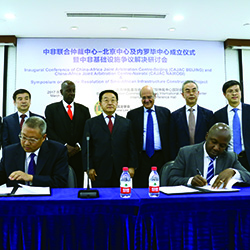Carrie Yang and Amanda Li of Clyde & Co contemplate how the insurance market will change in China once the government implements strict liability for food safety.
 There does not seem to be a week that goes by when a story on food safety in China is not reported in the media. The infamous Sanlu baby formula scandal where it was discovered that the toxic chemical melamine was used in Sanlu’s products eventually led to the company’s demise and this was followed by a series of other food scandals including illegally recycled cooking oil, fake eggs, industrial gelatin, and chromium-contaminated drug capsules. The introduction of food liability insurance in China could not come at a better time. Too little, too late? Typically, the government has been involved and led the settlement of claims in major food scandals given the public’s outcry/ the nationwide concern in the aftermath of such a revelation. It can be said, quite candidly, that food companies generally lack sufficient awareness of their responsibilities and the liabilities associated with food safety. Following the implementation of the PRC Food Security Law from June 1, 2009, several insurance companies such as PICC, Chartis, Dubon and Chang An have launched products in relation to food liability. However, it has been reported that less than 10 percent of companies in the food industry have purchased food liability insurance. And since the food liability insurance market is very limited, no official statistics are presently available. Potential growth |
 Until compulsory/strict liability is put in place by the Chinese government, sadly there will be little incentive for food producers to seek coverage. It is therefore clear that as soon as the Chinese government imposes strict liability in this context, this will become a rapid growth product area for insurance companies. If liability for food safety becomes mandatory under Chinese law, it is expected that Chinese insurers will take the lead in providing the relevant cover. It may also become a very policy-oriented area and the China Insurance Regulatory Commission (CIRC) may impose restrictions for foreign players to participate in such a market if it is compulsory. On the other hand, for products which involve other jurisdictions, such as export food product liability, it is expected that foreign invested insurers such as Chartis and ACE-Huatai will take the lead due to their familiarity with the local legal environment in the overseas market (e.g. the US) as well as their underwriting experience in the relevant regions. Pilot projects paving the way For example, certain retail food operators in Yangzhou, Jiangsu Province entered into commodity liability insurance contracts with Chang An Property and Liability Co Ltd in 2008. This pilot project was led by Jiangsu Administration of Industry and Commerce, which is responsible for consumer rights protection. In 2007 and 2008 respectively, the local Bureau of Quality and Technical Supervision in Xuhui District, Shanghai launched a pilot product liability insurance project. Under this pilot project, the food producers in Xuhui District, Shanghai, upon obtaining their consent, were able to purchase product liability insurance from Ping An. The average premium paid by each food producer was around RMB20,000 in 2007 and RMB18,000 in 2008 respectively. After the 2008 Chinese milk scandal, a claim of around RMB100,000 was paid to Shanghai Guan Sheng Yuan Food Ltd (the producer of well-known White Rabbit creamy candies. Since 2010, the Guangxi Bureau of Quality and Technical Supervision launched a pilot project requesting producers of certain types of food (that is, sugar, drinking water, dairy products, etc) to purchase food liability insurance. To read the ASIAN-MENA COUNSEL article Click Here (Note, if you are using an iPhone or iPad you can also download this article directly to your iBooks after it opens in Google Docs). |
IN-HOUSE OPINION: If you are an in-house counsel and you have a comment or an opinion you’d like to share either on this article or its subject matter, contact us at: inhouse@inhousecommunity.com with the article title in the subject line, stating clearly if you wish your comments to remain ‘Private’ or ‘Anonymous’.




















